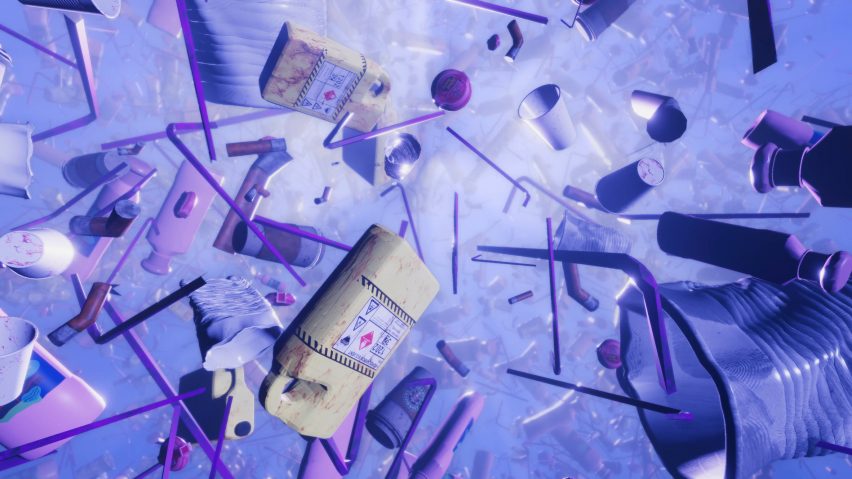
SCI-Arc's Fiction and Entertainment graduates imagine future worlds
From a desolate vision of LA burning to a VR experience of a polluted ocean, Dezeen has selected four projects created by graduates of the Fiction and Entertainment masters program at the Southern California Institute of Architecture.
SCI-Arc's MS Fiction and Entertainment program is led by Liam Young and tutored by Alexey Marfin. Young is a speculative architect who features in Dezeen's award-winning documentary Elevation and is one of the speakers at Dezeen Day.
The course links students with professionals including filmmakers, animators and video game producers and encourages them to use the practices of popular culture to imagine future worlds.
Highlights of work produced on the course included a VR journey through floating waste in the ocean, a film that explores a future Los Angeles ravaged by wildfires, a fashion editorial set in a world ruled by god-like queer colossi and an imagined landscape transformed by vast machines in response to music.
Here are the four standout projects from this years' graduates:
The Pantheon of Queer Mythology by Enrique Agudo
Enrique Agudo's short film The Pantheon of Queer Mythology presents viewers with a series of god-like figures set within intricate and fantastical 3D environments, each representative of a different aspect of the contemporary queer experience.
The colossal figures at the centre of the film, which Agudo describes as "a fashion editorial in virtual space", wear outfits that were styled on real models. The outfits were turned into digital figures through the process of photogrammetry – where a composite 3D model is created by feeding a multiplicity of photographs of an object or space into a computer programme.
Embedded above is one chapter of the film, which features a regal character named Griyah sitting on a sinking pile of detritus. Nearby, a group of figures dance on an island - according to Agudo, these represent Griyah's "gay, bi and lesbian comrades, [who] dance endless nights on solid land because they had the option of camouflaging with their common oppressors without betraying their identity."
Breach by Rick Farin
Breach, a project by digital artist Rick Farin, is an animated film produced using a game engine that conjures a future Los Angeles where bands of radical wildfire survivors roam the landscape as scavengers. Farin's vivid animations fill the air with floating specks of ash and ember, and populate the basin of the LA River with wild animals.
Outlandishly costumed human characters are pictured eking out an existence in the post-apocalyptic city, navigating burning wreckages on stilts and hunting for food with bow and arrow.
Farin in known for his work outside of the Fiction and Entertainment course, including a virtual-reality film featuring a 3D-scanned avatar of electronic musician Gaika, and a digital personification of model Slick Woods created for the cover of Dazed Beauty.
Breach will be showcased as an interactive installation in November at MIRA Festival 2019 in Barcelona.
Current Affairs by Shuruq Tramontini
Architect and multi-media artist Shuruq Tramontini is the creator of Current Affairs, an interactive VR experience that allows participants to explore an ocean densely polluted with a swirling mass of plastic waste.
The project is an exaggerated version of the Pacific garbage patch, an vast area of sea between Hawaii and California with a high concentration of plastic waste. In the VR experience an octopus leads viewers into an underwater environment packed full of pieces of rubbish.
Tramotini says that the experience is meant to confront participants with the consequences of their daily routines. It also highlights the misinformation surrounding the often misunderstood Pacific garbage patch, which is often depicted as an almost island-like mass of plastic, but is actually an area with a high concentration of small and microscopic pieces of plastic.
Mojo by Jeremy Kamal
Mojo is a computer-generated music video created by animator and music producer Jeremy Kamal, who presents viewers with a future in which afro-American values are "the predominant cultural model".
In Hartley's vision, vast machines operated by music producers move over a flood plain landscape, using bass notes from amplified music to vibrate bodies of water.
These vibrations displace the water so that it irrigates the surrounding soil, watering plants distributed by seed-dropping drones.
The music video portrays a world in which automation has removed the need for manual human labour and the Earth's landscape has become a platform for self-expression rather than a resource that needs to be exploited.
Kamal created the track used in the music video in collaboration with music producer Nate Buttel.